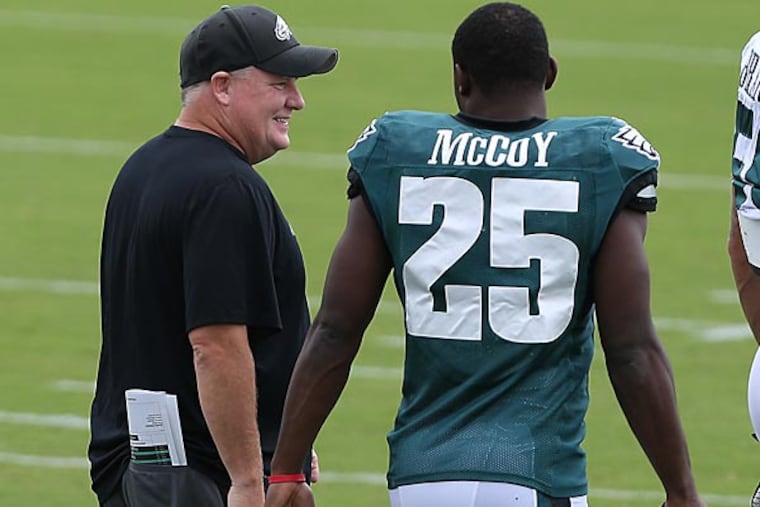Why Chip Kelly lost faith in LeSean McCoy
NFL Network analyst Brian Baldinger says McCoy didn't run with the same abandon last season.

SO NOW that we've beaten to a pulp LeSean McCoy's jilted premise that Chip Kelly doesn't like talent-rich African-American players, the question remains: Why, exactly, is McCoy a Buffalo Bill these days and not a Philadelphia Eagle?
Yes, I know Kelly's explanation claimed it was simply a monetary decision, that he could fill his linebacker need with a lesser-priced Kiko Alonso and have oodles of money left to add a lesser-priced running back - a two-for-one, I think it was called.
But the cold fact remains that when the frenzy cleared, Kelly had added not one, but two running backs to replace McCoy. And if you add all three contracts up, well, it's more.
What Kelly won't say, because he's smart enough not to create the kind of animosity McCoy did when he implied his ex-coach is a racist, is that he could no longer trust McCoy. Not just to hit the holes quickly, but to run with the same abandon he did in 2013 when he was out to prove he was the best running back in the world. (Remember all that back and forth with Adrian Peterson?)
In that record-making season, McCoy rushed for more than 100 yards seven times. He ran for more than 130 in six of those games, and he totaled over 150 in four.
Last year there were four 100-yard games - although, to be fair, he finished with 99 in the final meaningless game against the Giants. Injuries to the offensive line were certainly a factor, and McCoy's rushing total of 1,319 still put him in the conversation about elite running backs.
So why would there be any disillusionment?
"I think of the Seattle game,'' NFL network analyst Brian Baldinger said earlier this week at the Eagles OTAs. "He had the biggest hole he saw all year. The biggest hole. He should have hit his head on the goal post. But he saw Earl Thomas coming on a dead sprint to blow him up. And he curled up and fell down.
"It's a 10-point game, anybody's game. And it was a game that really swung everything in December. But I think Chip saw that. And between that, taking him off the field on third down, taking him off the field on goal line . . . [Kelly was saying] 'He's just not tough enough or what I want.' "
As last season wore on, McCoy surrendered red-zone touches to both Chris Polk and Darren Sproles, was even taken off the field for more and more of them. Close losses to San Francisco, Arizona and finally Washington all included pivotal plays in which McCoy could not convert short-yardage runs.
Again, it's hard to determine whether McCoy or his patched-together line bears more fault on these plays. But since Kelly did nothing to upgrade that line in the offseason either through trades or the draft, and since McCoy is no longer here, it's not hard to figure out to whom Kelly gave the lion's share of blame.
So I asked Eagles center Jason Kelce about it. Kelce is an honest quote, and in cases like this, he is a careful one, too. This is what he said:
"Every back is a little bit different. I'll put it in terms like this: I haven't been in a game situation with two of the guys [DeMarco Murray and Ryan Mathews]. But speaking in terms of last year, there's a different feel blocking for a guy like LeSean McCoy as compared to Chris Polk. They both carry the ball differently, they both run differently."
Does that influence blocking?
"You don't do anything differently, but you anticipate things differently,'' Kelce said. "So meaning, I know if I'm blocking a nose guard on an inside zone play, I understand that if I can just seal him really quick, it's going to hit now. Whereas if I try to do that with a different back who's going to take a little longer, it's going to run into some gray areas. Then I kind of have to stretch the play more, and create more movement.''
In other words, I said, he can sell out more blocking for a quick-hitting back?
"I wouldn't phrase it like that,'' Kelce said.
Because he's careful with his words. But that's what it sounded like to me, and that's what Kelly's backfield revamping seems to suggest.
Yes, there are a whole lot of stats out there that suggest Murray and Mathews aren't that much different than LeSean McCoy when it comes to averages and percentages of success.
What they can't measure is a coach's faith, sustained or eroded through those little plays at critical junctures that often decide outcomes and define seasons.
On Twitter: @samdonnellon
Columns: ph.ly/Donnellon